For the 2025 school year, there are 5 public schools serving 1,777 students in Troy City School District. This district's average testing ranking is 4/10, which is in the bottom 50% of public schools in Alabama.
Public Schools in Troy City School District have an average math proficiency score of 24% (versus the Alabama public school average of 27%), and reading proficiency score of 38% (versus the 47% statewide average).
Minority enrollment is 71% of the student body (majority Black), which is more than the Alabama public school average of 49% (majority Black).
Overview
This School District
This State (AL)
# Schools
5 Schools
1,520 Schools
# Students
1,777 Students
743,516 Students
# Teachers
102 Teachers
42,637 Teachers
Student : Teacher Ratio
17:1
17:1
District Rank
Troy City School District, which is ranked within the bottom 50% of all 145 school districts in Alabama (based off of combined math and reading proficiency testing data) for the 2021-2022 school year.
The school district's graduation rate of 90-94% has stayed relatively flat over five school years.
Overall District Rank
#90 out of 145 school districts
(Bottom 50%)
(Bottom 50%)
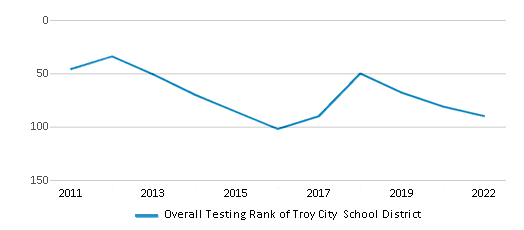
Math Test Scores (% Proficient)
24%
29%
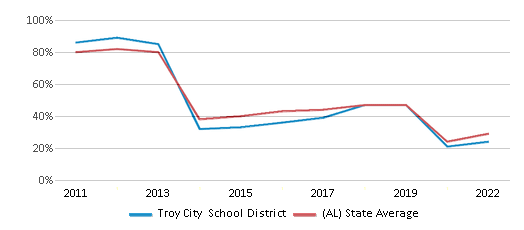
Reading/Language Arts Test Scores (% Proficient)
38%
47%
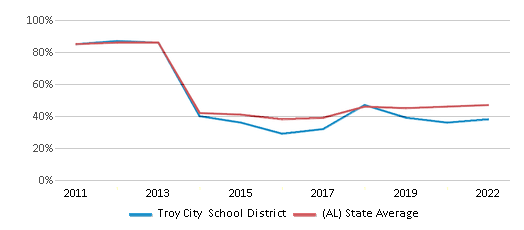
Science Test Scores (% Proficient)
27%
38%
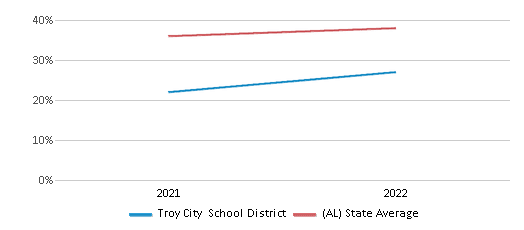
Graduation Rate
90-94%
88%
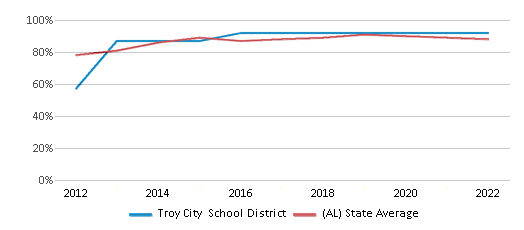
Students by Ethnicity:
Diversity Score
0.54
0.63
# American Indian Students
2 Students
5,986 Students
% American Indian Students
n/a
1%
# Asian Students
41 Students
10,976 Students
% Asian Students
2%
1%
# Hispanic Students
64 Students
83,354 Students
% Hispanic Students
4%
11%
# Black Students
1,100 Students
234,256 Students
% Black Students
62%
32%
# White Students
510 Students
379,490 Students
% White Students
29%
51%
# Hawaiian Students
n/a
824 Students
% Hawaiian Students
n/a
n/a
# Two or more races Students
60 Students
28,630 Students
% of Two or more races Students
3%
4%
Students by Grade:
# Students in PK Grade:
52
21,953
# Students in K Grade:
139
55,899
# Students in 1st Grade:
142
58,528
# Students in 2nd Grade:
146
57,991
# Students in 3rd Grade:
153
55,161
# Students in 4th Grade:
113
54,236
# Students in 5th Grade:
131
54,179
# Students in 6th Grade:
120
54,861
# Students in 7th Grade:
121
55,768
# Students in 8th Grade:
135
56,376
# Students in 9th Grade:
137
59,139
# Students in 10th Grade:
117
56,986
# Students in 11th Grade:
145
53,181
# Students in 12th Grade:
126
49,258
# Ungraded Students:
-
-
District Revenue and Spending
The revenue/student of $12,595 in this school district is less than the state median of $13,006. The school district revenue/student has grown by 29% over four school years.
The school district's spending/student of $11,232 is less than the state median of $12,220. The school district spending/student has grown by 9% over four school years.
Total Revenue
$22 MM
$9,671 MM
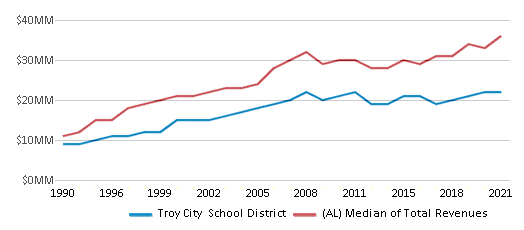
Spending
$20 MM
$9,086 MM
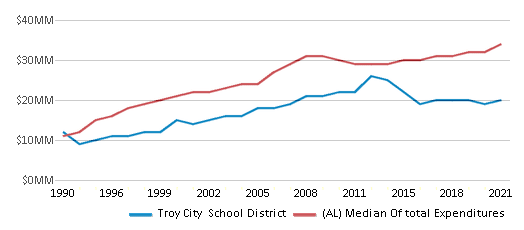
Revenue / Student (19-20)
$12,595
$13,006
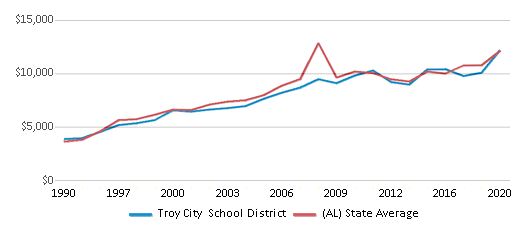
Spending / Student (19-20)
$11,232
$12,220
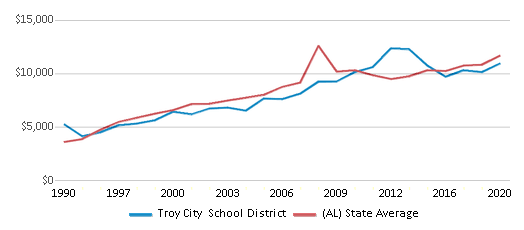
Best Troy City School District Public Schools (2025)
School
(Math and Reading Proficiency)
(Math and Reading Proficiency)
Location
Grades
Students
Rank: #11.
Troy Elementary School
(Math: 31% | Reading: 41%)
Rank:
Rank:
6/
Top 50%10
503 Gibbs St
Troy, AL 36081
(334) 566-1444
Troy, AL 36081
(334) 566-1444
Grades: PK-6
| 996 students
Rank: #22.
Charles Henderson Middle School
(Math: 18% | Reading: 41%)
Rank:
Rank:
5/
Bottom 50%10
800 Elm St
Troy, AL 36081
(334) 566-5770
Troy, AL 36081
(334) 566-5770
Grades: 7-8
| 256 students
Rank: #33.
Charles Henderson High School
(Math: 10-14% | Reading: 15-19%)
Rank:
Rank:
2/
Bottom 50%10
150 George Wallace Dr
Troy, AL 36081
(334) 566-3510
Troy, AL 36081
(334) 566-3510
Grades: 9-12
| 525 students
Rank: n/an/a
Alternative Learning Center
Alternative School
211 Lake Ave
Troy, AL 36081
(334) 566-7134
Troy, AL 36081
(334) 566-7134
Grades: 6-12
| n/a students
Rank: n/an/a
Troypike Regional Center For Technology
Vocational School
285 Gibbs Street
Troy, AL 36081
(334) 566-5395
Troy, AL 36081
(334) 566-5395
Grades: 10-12
| n/a students
Frequently Asked Questions
How many schools belong to Troy City School District?
Troy City School District manages 5 public schools serving 1,777 students.
What is the rank of Troy City School District?
Troy City School District is ranked #90 out of 145 school districts in Alabama (bottom 50%) based off of combined math and reading proficiency testing data for the 2021-2022 school year.
What is the racial composition of students in Troy City School District?
62% of Troy City School District students are Black, 29% of students are White, 4% of students are Hispanic, 3% of students are Two or more races, and 2% of students are Asian.
What is the student/teacher ratio of Troy City School District?
Troy City School District has a student/teacher ratio of 17:1, which is equal to the Alabama state average of 17:1.
What is Troy City School District's spending/student ratio?
The school district's spending/student of $11,232 is less than the state median of $12,220. The school district spending/student has grown by 9% over four school years.
Recent Articles

Year-Round Or Traditional Schedule?
Which is more appropriate for your child? A year-round attendance schedule or traditional schedule? We look at the pros and cons.

Why You Should Encourage Your Child to Join a Sports Team
Participating in team sports has a great many benefits for children, there is no doubt. In this article you will learn what those benefits are.

White Students are Now the Minority in U.S. Public Schools
Increasing birth rates among immigrant families from Asia and Central and South America, combined with lower birth rates among white families, means that for the first time in history, public school students in the United States are majority-minority. This shift in demographics poses difficulties for schools as they work to accommodate children of varying language abilities and socio-economic backgrounds.





